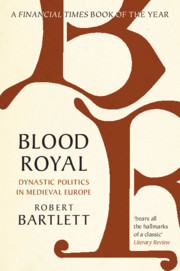Book contents
- Blood Royal
- The James Lydon Lectures in Medieval History and Culture
- Blood Royal
- Copyright page
- Dedication
- Contents
- Figures
- Preface and Acknowledgements
- Abbreviations
- Introduction Royal Families
- Part I The Life Cycle
- Chapter 1 Choosing a Bride
- Chapter 2 Waiting for Sons to be Born
- Chapter 3 Fathers and Sons
- Chapter 4 Female Sovereigns
- Chapter 5 Mistresses and Bastards
- Chapter 6 Family Dynamics
- Chapter 7 Royal Mortality
- Part II A Sense of Dynasty
- Book part
- Notes
- Bibliography of Works Cited
- Index
Chapter 3 - Fathers and Sons
from Part I - The Life Cycle
Published online by Cambridge University Press: 09 July 2020
- Blood Royal
- The James Lydon Lectures in Medieval History and Culture
- Blood Royal
- Copyright page
- Dedication
- Contents
- Figures
- Preface and Acknowledgements
- Abbreviations
- Introduction Royal Families
- Part I The Life Cycle
- Chapter 1 Choosing a Bride
- Chapter 2 Waiting for Sons to be Born
- Chapter 3 Fathers and Sons
- Chapter 4 Female Sovereigns
- Chapter 5 Mistresses and Bastards
- Chapter 6 Family Dynamics
- Chapter 7 Royal Mortality
- Part II A Sense of Dynasty
- Book part
- Notes
- Bibliography of Works Cited
- Index
Summary
This chapter begins by discussing the ways that kings tried to ensure that they would be succeeded by their sons, through designation or coronation in the father’s lifetime. Such strategies would also remove the danger of interregna, kingless gaps between reigns. Written rules of succession are also found, increasingly frequently in the later Middle Ages, a period that also saw the development of formal titles for the heir, such as Dauphin and Prince of Wales, although such titles did not in fact make the succession any more secure. Eventually it came to be commonly held that the heir succeeded immediately on the king’s death. Since kings’ sons were brought up to expect to rule, they sometimes became impatient waiting for their fathers to die and this could lead to armed conflict between father and son. The short life expectancy of the medieval period also meant that kings often died while their sons were young and hence decisions had to be made about whether to accept a minor king. Some systems, e.g. the Irish, excluded this possibility, but there are at least 90 medieval cases, when arrangements for some form of regency were necessary, with all the competitive politics it involved.
- Type
- Chapter
- Information
- Blood RoyalDynastic Politics in Medieval Europe, pp. 89 - 123Publisher: Cambridge University PressPrint publication year: 2020



